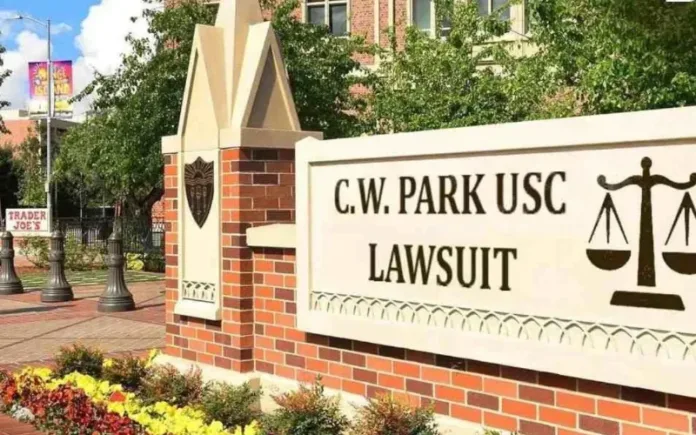Law
C.W. Park USC Lawsuit
Published
11 months agoon
By
Jack
Table of Contents
ToggleUSC Faces Lawsuit from C.W. Park Over Unpaid Wages
C.W. Park USC Lawsuit: The University of Southern California (USC) is currently facing a lawsuit filed by former employee C.W. Park, alleging unpaid wages. This legal battle has raised significant concerns and put the spotlight on labor practices within the university. Understanding the allegations against USC is crucial in grasping the intricacies of this complex case.
Understanding the Allegations Against USC
At the heart of the lawsuit are allegations made by C.W. Park, a former USC employee who claims to have been unfairly denied wages for work performed during their tenure. Park asserts that USC failed to fulfill its legal obligation to compensate them for their time and efforts.
These allegations have raised significant concerns within the USC community and the broader public. The case has garnered attention not only for its potential impact on the affected employee but also for the potential implications it may have on labor practices within the university.
It is important to delve deeper into the specific details of the allegations and understand the context in which they arise. By doing so, we can gain a comprehensive understanding of the situation and its potential ramifications.
The Role of C.W. Park in the Lawsuit
C.W. Park serves as the key plaintiff in this lawsuit, actively seeking recourse for the alleged unpaid wages. Park’s involvement is essential as they provide firsthand insight into their experiences with USC and the specific details surrounding their compensation.
Park’s role in the lawsuit extends beyond being a mere witness. They have become a symbol of the larger issue at hand, representing not only their own experiences but also the experiences of other employees who may have faced similar challenges in receiving fair compensation.
Through their participation, Park aims to shed light on the alleged practices within USC and advocate for fair treatment and compensation for all employees. Their courage in coming forward and pursuing legal action serves as an inspiration for others who may have faced similar situations.
The Nature of Unpaid Wages Claims
Unpaid wages claims are a significant concern for employees, as they create financial strain and undermine the principle of equal pay for equal work. In this case, the unpaid wages claims revolve around whether USC fulfilled its legal obligation to properly compensate its employees.
The issue of unpaid wages is not unique to USC but is a widespread concern in many industries. It raises questions about the transparency and fairness of compensation practices, as well as the overall treatment of employees.
By examining the nature of unpaid wages claims, we can gain insight into the broader issue of wage inequality and the challenges faced by employees in asserting their rights. This case serves as a reminder of the importance of fair compensation and the need for organizations to uphold their legal obligations.
Furthermore, the outcome of this lawsuit may have far-reaching implications for USC and other institutions, potentially leading to changes in labor practices and policies to ensure fair treatment and compensation for all employees.
Legal Framework for Wage and Hour Disputes
Wage and hour disputes fall within a broader legal framework that governs employee compensation. Understanding the federal and state laws surrounding this issue is crucial in assessing the validity of the allegations against USC.
When it comes to wage and hour disputes, it is essential to have a comprehensive understanding of the legal landscape. By examining the federal and state laws that govern employee compensation, we can gain insight into the rights and obligations of both employers and employees.
Federal Laws Governing Wage Payment
The Fair Labor Standards Act (FLSA) serves as the cornerstone of federal wage and hour laws. Enacted in 1938, this landmark legislation established minimum wage and overtime pay requirements for covered employees. The FLSA also provides guidelines for ensuring fair compensation, prohibiting employers from engaging in unfair labor practices such as withholding wages or misclassifying employees.
Under the FLSA, covered employees are entitled to a minimum wage, which is currently set at $7.25 per hour. However, some states have set their own minimum wage rates, which may be higher than the federal standard. In cases where both federal and state minimum wage laws apply, the higher rate must be paid.
In addition to minimum wage requirements, the FLSA also mandates that covered employees be paid overtime wages for hours worked beyond the standard 40-hour workweek. Overtime pay must be at least one and a half times the employee’s regular rate of pay. However, certain exemptions exist for specific categories of employees, such as executives, professionals, and administrative personnel.
California State Laws on Employee Compensation
In addition to federal laws, California has its own set of regulations that further protect employee rights. Known for its progressive stance on labor issues, California has implemented stringent laws to ensure fair compensation for workers.
One significant difference between California and federal law is the state’s minimum wage rate. While the federal minimum wage is $7.25 per hour, California has set its minimum wage higher to account for the higher cost of living. As of January 2021, the minimum wage in California is $13 per hour for employers with 25 or fewer employees and $14 per hour for employers with 26 or more employees. These rates are set to increase incrementally over the coming years.
California also has specific laws regarding meal and rest breaks. In general, employees are entitled to a 30-minute meal break for every five hours worked and a 10-minute rest break for every four hours worked. Failure to provide these breaks can result in additional compensation for the employee.
Furthermore, California law requires employers to provide accurate wage statements to employees, detailing the hours worked, wages earned, and deductions made. This transparency ensures that employees can verify the accuracy of their compensation and identify any discrepancies.
In wage and hour disputes, California law provides additional avenues for seeking relief. Employees can file a complaint with the California Labor Commissioner’s Office or pursue a private lawsuit to recover unpaid wages, penalties, and other damages. The state also allows for the recovery of attorney’s fees and costs, incentivizing employees to assert their rights.
By understanding the interplay between federal and state laws, we can better evaluate the allegations against USC and determine the appropriate legal recourse for wage and hour disputes. It is crucial to consult with experienced legal professionals who specialize in employment law to navigate the complexities of these regulations.
USC’s Response to the Lawsuit
As news of the lawsuit surfaced, USC quickly addressed the allegations and provided its perspective on the matter. The university’s response was swift and decisive, reflecting its commitment to transparency and accountability.
Understanding the gravity of the situation, USC recognized the importance of addressing the allegations head-on. In a series of official statements, the university expressed its willingness to cooperate fully with the legal proceedings, demonstrating a commitment to upholding the principles of justice and fairness.
Official Statements from the University
USC has released official statements in response to the lawsuit, acknowledging the legal proceedings and asserting a commitment to addressing the allegations. These statements shed light on USC’s stance and serve to manage public perception.
Emphasizing the significance of the allegations, USC’s official statements underscore the university’s dedication to ensuring a safe and inclusive environment for all students, faculty, and staff. The university’s leadership has expressed deep concern for those affected by the alleged misconduct, vowing to take appropriate action to prevent such incidents from occurring in the future.
Moreover, USC’s statements emphasize the importance of due process and the presumption of innocence. The university recognizes the need for a thorough investigation to uncover the truth and ensure that justice is served. USC has pledged its full cooperation with the legal authorities involved, demonstrating a commitment to transparency and accountability.
Potential Implications for USC’s Reputation
The lawsuit poses potential ramifications for USC’s reputation as an educational institution. The way the university handles this legal challenge will undoubtedly impact how it is perceived within the academic community and by the general public.
Recognizing the gravity of the situation, USC is taking proactive steps to address the allegations and mitigate any potential damage to its reputation. The university has established an independent task force to conduct a comprehensive review of its policies and procedures, ensuring that they align with the highest standards of integrity and ethics.
Furthermore, USC is actively engaging with its stakeholders, including students, faculty, alumni, and the wider community, to foster an open dialogue and address any concerns. The university is committed to transparency and accountability, striving to rebuild trust and restore its reputation as a leading educational institution.
USC’s response to the lawsuit is a testament to its commitment to fostering a safe and inclusive environment for all members of its community. By addressing the allegations head-on and taking concrete steps to prevent similar incidents in the future, the university is demonstrating its dedication to upholding its core values and ensuring the well-being of its students.
Broader Impact on Higher Education Institutions
The legal battle between USC and C.W. Park raises broader questions about wage and hour practices within higher education institutions.
Precedents in Wage and Hour Disputes
This lawsuit is not the first instance of a wage and hour dispute within the higher education sector. Precedents set by prior cases will play a role in shaping the legal landscape for this lawsuit and potentially future disputes.
Future Implications for University Employment Practices
The outcome of this lawsuit may impact employment practices within universities. Depending on the court’s ruling, institutions may be prompted to reassess and modify their compensation policies to ensure compliance with labor laws.
Next Steps in the Legal Process
As the lawsuit progresses through the legal system, the next steps will determine the resolution of this ongoing dispute.
Possible Outcomes of the Lawsuit
The lawsuit’s outcome could entail various scenarios, including a settlement, a trial, or even a dismissal. These possible outcomes will have far-reaching implications for both parties involved and potentially set new standards for similar cases in the future.
The Role of the Courts in Resolving Wage Disputes
The courts play a vital role in resolving wage disputes, as they are tasked with ensuring impartiality and upholding the principles of justice. In this case, the court will ultimately decide whether or not USC breached its legal obligations to its employees.
In conclusion, USC finds itself embroiled in a lawsuit filed by C.W. Park, alleging unpaid wages. As the legal process unfolds, it becomes essential to understand the allegations against USC, the applicable legal framework, and the potential implications not only for the university but also for the broader higher education community. The outcome of this lawsuit will have significant consequences for the involved parties and may shape future labor practices within the academic sector.

